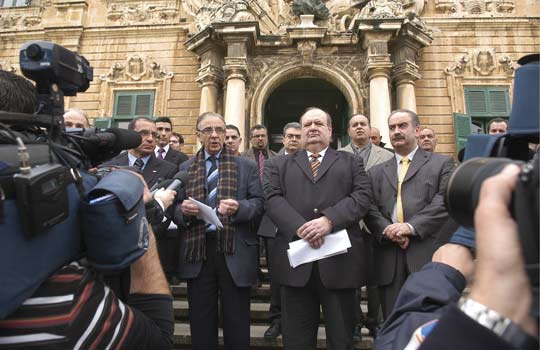According to a study by economist Edward Scicluna, who was commissioned by the 11 unions, a substantial number of people, including one- and two-person households, most of whom are pensioners, would be excluded from the eco reduction.
Times of Malta – Saturday, 10th January 2009
Unions urge consumers not to pay utility bills
Union leaders deliver a speech outside the office of the Prime Minister at the Auberge de Castille, Valletta yesterday.
Trade unions are calling on people not to pay their water and electricity bills within the 45-day time window imposed by the service providers.
The directive, which, the unions warned, is just the first in a series until the Prime Minister decides to meet them to discuss pending issues, will bring about “enormous cash flow problems for Enemalta”, chairman Alex Tranter said when contacted yesterday.
It could even mean that Enemalta would not have enough money to pay for its oil purchases, he added.
Representatives of the 11 unions, which include the General Workers’ Union, the Malta Union of Teachers and the Malta Union of Midwives and Nurses, gathered outside Castille yesterday afternoon on the day their ultimatum to Prime Minister Lawrence Gonzi expired.
The unions have been seeking a clarification meeting with the government on their queries for the past months. The Times has reported that Dr Gonzi was non-committal when asked for a direct reply on whether he was ruling out the possibility of meeting the unions.
Speaking on the union’s behalf, MUT president John Bencini did not exclude the possibility of additional directives in the very near future. He said each union was free to issue fresh directives as it deemed fit.
Dr Gonzi had written to the unions some weeks ago in reply to their request for clarifications on the new energy rates, saying that, since their queries were of a technical nature, they ought to seek their replies from the Malta Resources Authority. Questioned about this stand, the Office of the Prime Minister insisted this was clearly an issue of a technical nature and was also taken up by the same unions in a meeting with the auditing firm KPMG.
“If further clarifications are required, and since the issue is evidently technical in nature, then it must be addressed to the regulator who is the independent arbiter and who has the duty to safeguard the interest of the consumer.” Last night, it issued a statement reiterating what it has been telling the unions for weeks and referring the unions to the MRA.
However, the unions do not want to meet the MRA and are still insisting they meet the government.
When The Times asked why the unions had a problem meeting the MRA and then get back to Dr Gonzi if they had further questions, Mr Bencini said the regulator was never present during previous meetings on the tariffs.
He said their questions were about the social impact these new rates were having on families and, consequently, could only be answered by a politician.
His reply was echoed by GWU general secretary Tony Zarb who added that the unions did not exclude meeting the MRA. Mr Bencini said the unions were querying the government’s estimates that about 73 per cent of families would benefit from eco reductions on their bills.
He said families who received their bills confirmed the unions’ concerns: their bills had increased drastically because they did not qualify for the eco reduction.
Last November, Dr Gonzi had held marathon meetings with representatives of 20 unions, which had initially emerged from the meeting very positive. However, soon after, the unions split in their position on the final agreement published by the government.
One group, made up of the Union Haddiema Maghqudin and the Confederation of Maltese Trade Unions, insisted that the government agreement was the one the unions had acceded to during their meeting with Dr Gonzi.
According to a study by economist Edward Scicluna, who was commissioned by the 11 unions, a substantial number of people, including one- and two-person households, most of whom are pensioners, would be excluded from the eco eduction.
Sections of the media had reported that Prof. Scicluna had met Dr Gonzi to discuss these claims. When asked about this meeting yesterday, Mr Bencini denied knowing what went on during this meeting, even though Prof. Scicluna is the unions’ consultant. Apart from the GWU, the MUMN and the MUT, the unions include the Union of Cabin Crew, the Union Haddiema Bank Centrali, the Union Technical and Clerical Mepa, the Union Professjonisti Awtorità ghall-Ambjent u Ppjanar, the University of Malta Academic Staff Association, the Airline Pilots Association, the Union Periti u Inginiera Servizz Pubbliku and the Association of Airline Engineers.
Meanwhile, the Labour Party spokesman for social dialogue, Gino Cauchi expressed his disappointment that Dr Gonzi was hiding behind the MRA to avoid meeting the unions. His refusal to meet unions was a show of arrogance, he said.

2 responses to “Enemalta risks facing ‘enormous cash flow problems’”
I like this web blog it’s a master piece! Glad I detected this ohttps://69v.topn google.Money from blog
I found this post incredibly useful. The tips and insights you’ve shared are going to be very helpful for my work.